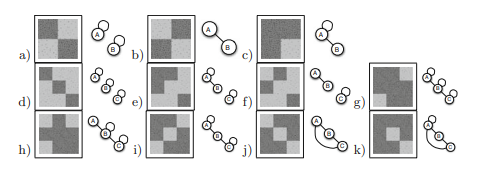如果你也在 怎样代写复杂网络complex networks这个学科遇到相关的难题,请随时右上角联系我们的24/7代写客服。
复杂网络是由数量巨大的节点和节点之间错综复杂的关系共同构成的网络结构。
statistics-lab™ 为您的留学生涯保驾护航 在代写复杂网络complex networks方面已经树立了自己的口碑, 保证靠谱, 高质且原创的统计Statistics代写服务。我们的专家在代写复杂网络complex networks方面经验极为丰富,各种代写复杂网络complex networks相关的作业也就用不着说。
我们提供的复杂网络complex networks及其相关学科的代写,服务范围广, 其中包括但不限于:
- Statistical Inference 统计推断
- Statistical Computing 统计计算
- Advanced Probability Theory 高等楖率论
- Advanced Mathematical Statistics 高等数理统计学
- (Generalized) Linear Models 广义线性模型
- Statistical Machine Learning 统计机器学习
- Longitudinal Data Analysis 纵向数据分析
- Foundations of Data Science 数据科学基础

统计代写|复杂网络代写complex networks代考|Non-hierarchical
The non-hierarchical methods approach the problem from a different perspective. In principle, they intend to calculate a full distance matrix for the nodes of the network. This can then be treated by conventional techniques.
One of the earliest approaches to community detection is due to Eriksen et al. $[41,42]$. They study a diffusion process on a network and analyze the decay of the modes of the following diffusive system with discrete time:
2622 Standard Approaches to Network Structure: Block Modeling
$$
\rho_{i}(t+1)-\rho_{i}(t)=\sum_{j}\left(T_{i j}-\delta_{i j}\right) \rho_{j}(t)
$$
Here $T_{i j}$ represents the adjacency matrix of the network such that $T_{i j}=1 / k_{j}$ for $A_{i j}=1$ and zero otherwise. Hence $T_{i j}$ represents the probability of a random walker to go from $j$ to $i$. The decay of a random initial configuration $\rho(t=0)$ toward the steady state is characterized by the eigenmodes of the transition matrix $T_{i j}$. The eigenvectors corresponding to the largest eigenvalues can then be used to define a distance between nodes which helps in identifying communities. To do this, the eigenvectors belonging to the largest non-trivial positive eigenvalues are plotted against each other. This diffusion approach is very similar in spirit to other algorithms based on the idea of using flow simulations for community detection as suggested by van Dongen [43] under the name of “Markov clustering” (MCL).
The method presented by Zhou [44-46] first converts the sparse adjacency matrix of the graph into a full distance matrix by calculating the average time a Brownian particle needs to move from node $i$ to $j$. Then this distance matrix is clustered using ordinary hierarchical clustering algorithms. This approach is based on the observation that a random walker has shorter traveling time between two nodes if many (short) alternative paths exist.
Another spectral approach has been taken by Muños and Donetti [47]. They work with the Laplacian matrix of the network. The Laplacian is defined as
$$
L_{i j}=k_{i} \delta_{i j}-A_{i j} .
$$
Otherwise, the method proposed is similar to Ref. [41]. Plotting the nontrivial eigenvectors against each other gives a low-dimensional representation of a distance measure of the network on top of which a conventional clustering procedure then needs to operate.
Though these methods are able to recover known community structures with good accuracy, they suffer from being less intuitive. Communities found can only be interpreted with respect to the particular system under study, be it a diffusive system or the eigen vectors of the Laplacian matrix. Problematic is also that there is no local variant of these methods, i.e., there is no way to find the community around a given node using spectral methods.
统计代写|复杂网络代写complex networks代考|Optimization Based
A different approach which is reminiscent of the parametric clustering procedures known in computer science is the idea of searching for partitions with maximum modularity $Q$ using combinatorial optimization techniques [48]. This approach has been adopted by Guimera et al. in Refs. [2, 49] or Massen et al. $[50]$ using simulated annealing [51] or Duch and Arenas using extremal optimization [52].
Though this approach will be the preferred one for the remainder of this book, a number of issues remain. For the hierarchical algorithms, a community was to be understood as whatever the algorithm outputs. Now, it is not the algorithm that defines what a community is, but the quality function, i.e., the modularity $Q$ in this case. Also, the modularity $Q$ as defined by Newman [23] is parameter free and an understanding for hierarchical and overlapping structures needs to be developed.
统计代写|复杂网络代写complex networks代考|Conclusion
Block structure in networks is a very common and well-studied phenomenon. The concepts of structural and regular equivalence as well as the types of blocks defined for generalized block modeling are well defined but appear too rigid to be of practical use for large and noisy data sets. Diagonal block models or modular structures have received particular attention in the literature and have developed into an almost independent concept of cohesive subgroups or communities. The comparison of many different community definitions from various fields has shown that the concept of module or community in a network is only vaguely defined. The diversity of algorithms published is only a consequence of this vague definition. None of the algorithms could be called “ideal” in the sense that it combines the features of computational efficiency, accuracy, flexibility and adaptability with regard to the network and easy interpretation of the results. More importantly, none of the above-cited publications allows an estimation to which degree the community structure found is a reality of the network or a product of the clustering process itself. The following chapters are addressing these issues and present a framework in which community detection is viewed again as a special case of a general procedure for detecting block structure in networks.
复杂网络代写
统计代写|复杂网络代写complex networks代考|Non-hierarchical
非分层方法从不同的角度处理问题。原则上,他们打算计算网络节点的全距离矩阵。然后这可以通过常规技术处理。
最早的社区检测方法之一是由 Eriksen 等人提出的。[41,42]. 他们研究了网络上的扩散过程,并分析了以下扩散系统模式在离散时间下的衰减:
2622 网络结构的标准方法:块建模
ρ一世(吨+1)−ρ一世(吨)=∑j(吨一世j−d一世j)ρj(吨)
这里吨一世j表示网络的邻接矩阵,使得吨一世j=1/ķj为了一种一世j=1否则为零。因此吨一世j表示随机游走者离开的概率j到一世. 随机初始配置的衰减ρ(吨=0)向稳态的特征是转移矩阵的特征模态吨一世j. 然后可以使用对应于最大特征值的特征向量来定义节点之间的距离,这有助于识别社区。为此,将属于最大非平凡正特征值的特征向量相互绘制。这种扩散方法在精神上与其他基于使用流模拟进行社区检测的算法非常相似,正如 van Dongen [43] 以“马尔可夫聚类”(MCL)的名义提出的。
Zhou[44-46]提出的方法首先通过计算布朗粒子从节点移动所需的平均时间,将图的稀疏邻接矩阵转换为全距离矩阵一世到j. 然后使用普通的层次聚类算法对这个距离矩阵进行聚类。这种方法基于以下观察:如果存在许多(短)替代路径,则随机游走者在两个节点之间的旅行时间更短。
Muños 和 Donetti [47] 采用了另一种光谱方法。他们使用网络的拉普拉斯矩阵。拉普拉斯算子定义为
大号一世j=ķ一世d一世j−一种一世j.
否则,所提出的方法类似于参考文献。[41]。将非平凡特征向量相互绘制给出了网络距离测量的低维表示,然后需要在其上运行传统的聚类过程。
尽管这些方法能够以良好的准确性恢复已知的社区结构,但它们的直观性较差。发现的社区只能根据所研究的特定系统进行解释,无论是扩散系统还是拉普拉斯矩阵的特征向量。问题还在于这些方法没有局部变体,即无法使用谱方法找到给定节点周围的社区。
统计代写|复杂网络代写complex networks代考|Optimization Based
让人想起计算机科学中已知的参数聚类过程的另一种方法是搜索具有最大模块化的分区的想法问使用组合优化技术[48]。这种方法已被 Guimera 等人采用。在参考文献中。[2, 49] 或 Massen 等人。[50]使用模拟退火 [51] 或使用极值优化的 Duch 和 Arenas [52]。
尽管这种方法将是本书其余部分的首选方法,但仍然存在许多问题。对于分层算法,社区将被理解为算法输出的任何内容。现在,定义社区的不是算法,而是质量函数,即模块化问在这种情况下。此外,模块化问正如 Newman [23] 所定义的那样,它是无参数的,需要开发对分层和重叠结构的理解。
统计代写|复杂网络代写complex networks代考|Conclusion
网络中的块结构是一种非常普遍且经过充分研究的现象。结构等价和规则等价的概念以及为广义块建模定义的块类型已得到很好的定义,但对于大型和嘈杂的数据集来说似乎过于僵化而无法实际使用。对角块模型或模块化结构在文献中受到了特别的关注,并已发展成为一个几乎独立的凝聚子群或社区的概念。来自各个领域的许多不同社区定义的比较表明,网络中的模块或社区的概念只是模糊定义。已发表的算法的多样性只是这种模糊定义的结果。没有一种算法可以被称为“理想”,因为它结合了计算效率、准确性、网络的灵活性和适应性以及对结果的简单解释。更重要的是,以上引用的出版物都不允许估计所发现的社区结构在多大程度上是网络的现实或聚类过程本身的产物。以下章节将解决这些问题并提出一个框架,其中社区检测再次被视为检测网络中块结构的一般过程的特例。
统计代写请认准statistics-lab™. statistics-lab™为您的留学生涯保驾护航。统计代写|python代写代考
随机过程代考
在概率论概念中,随机过程是随机变量的集合。 若一随机系统的样本点是随机函数,则称此函数为样本函数,这一随机系统全部样本函数的集合是一个随机过程。 实际应用中,样本函数的一般定义在时间域或者空间域。 随机过程的实例如股票和汇率的波动、语音信号、视频信号、体温的变化,随机运动如布朗运动、随机徘徊等等。
贝叶斯方法代考
贝叶斯统计概念及数据分析表示使用概率陈述回答有关未知参数的研究问题以及统计范式。后验分布包括关于参数的先验分布,和基于观测数据提供关于参数的信息似然模型。根据选择的先验分布和似然模型,后验分布可以解析或近似,例如,马尔科夫链蒙特卡罗 (MCMC) 方法之一。贝叶斯统计概念及数据分析使用后验分布来形成模型参数的各种摘要,包括点估计,如后验平均值、中位数、百分位数和称为可信区间的区间估计。此外,所有关于模型参数的统计检验都可以表示为基于估计后验分布的概率报表。
广义线性模型代考
广义线性模型(GLM)归属统计学领域,是一种应用灵活的线性回归模型。该模型允许因变量的偏差分布有除了正态分布之外的其它分布。
statistics-lab作为专业的留学生服务机构,多年来已为美国、英国、加拿大、澳洲等留学热门地的学生提供专业的学术服务,包括但不限于Essay代写,Assignment代写,Dissertation代写,Report代写,小组作业代写,Proposal代写,Paper代写,Presentation代写,计算机作业代写,论文修改和润色,网课代做,exam代考等等。写作范围涵盖高中,本科,研究生等海外留学全阶段,辐射金融,经济学,会计学,审计学,管理学等全球99%专业科目。写作团队既有专业英语母语作者,也有海外名校硕博留学生,每位写作老师都拥有过硬的语言能力,专业的学科背景和学术写作经验。我们承诺100%原创,100%专业,100%准时,100%满意。
机器学习代写
随着AI的大潮到来,Machine Learning逐渐成为一个新的学习热点。同时与传统CS相比,Machine Learning在其他领域也有着广泛的应用,因此这门学科成为不仅折磨CS专业同学的“小恶魔”,也是折磨生物、化学、统计等其他学科留学生的“大魔王”。学习Machine learning的一大绊脚石在于使用语言众多,跨学科范围广,所以学习起来尤其困难。但是不管你在学习Machine Learning时遇到任何难题,StudyGate专业导师团队都能为你轻松解决。
多元统计分析代考
基础数据: $N$ 个样本, $P$ 个变量数的单样本,组成的横列的数据表
变量定性: 分类和顺序;变量定量:数值
数学公式的角度分为: 因变量与自变量
时间序列分析代写
随机过程,是依赖于参数的一组随机变量的全体,参数通常是时间。 随机变量是随机现象的数量表现,其时间序列是一组按照时间发生先后顺序进行排列的数据点序列。通常一组时间序列的时间间隔为一恒定值(如1秒,5分钟,12小时,7天,1年),因此时间序列可以作为离散时间数据进行分析处理。研究时间序列数据的意义在于现实中,往往需要研究某个事物其随时间发展变化的规律。这就需要通过研究该事物过去发展的历史记录,以得到其自身发展的规律。
回归分析代写
多元回归分析渐进(Multiple Regression Analysis Asymptotics)属于计量经济学领域,主要是一种数学上的统计分析方法,可以分析复杂情况下各影响因素的数学关系,在自然科学、社会和经济学等多个领域内应用广泛。
MATLAB代写
MATLAB 是一种用于技术计算的高性能语言。它将计算、可视化和编程集成在一个易于使用的环境中,其中问题和解决方案以熟悉的数学符号表示。典型用途包括:数学和计算算法开发建模、仿真和原型制作数据分析、探索和可视化科学和工程图形应用程序开发,包括图形用户界面构建MATLAB 是一个交互式系统,其基本数据元素是一个不需要维度的数组。这使您可以解决许多技术计算问题,尤其是那些具有矩阵和向量公式的问题,而只需用 C 或 Fortran 等标量非交互式语言编写程序所需的时间的一小部分。MATLAB 名称代表矩阵实验室。MATLAB 最初的编写目的是提供对由 LINPACK 和 EISPACK 项目开发的矩阵软件的轻松访问,这两个项目共同代表了矩阵计算软件的最新技术。MATLAB 经过多年的发展,得到了许多用户的投入。在大学环境中,它是数学、工程和科学入门和高级课程的标准教学工具。在工业领域,MATLAB 是高效研究、开发和分析的首选工具。MATLAB 具有一系列称为工具箱的特定于应用程序的解决方案。对于大多数 MATLAB 用户来说非常重要,工具箱允许您学习和应用专业技术。工具箱是 MATLAB 函数(M 文件)的综合集合,可扩展 MATLAB 环境以解决特定类别的问题。可用工具箱的领域包括信号处理、控制系统、神经网络、模糊逻辑、小波、仿真等。
